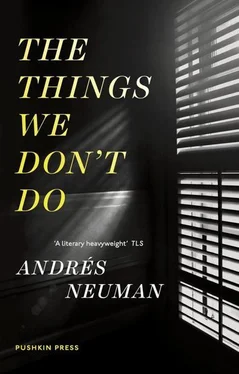What can I say about my enmity with Rubén? It was lacking in passion. Devoid of fireworks. More than an act of war, our mutual hatred was a habit. There was something mysterious and fascinating about the way in which, from the very beginning, we calmly recognized each other as rivals. Elena insisted on introducing us one winter morning, with that joyful enthusiasm it was impossible to resist. Rubén and I shook hands, looked each other in the eye and knew we would never be friends. He played his cards, I played mine. He gave a grimace of disgust, the same one he always wears, and I smiled at him with my most exemplary hypocrisy.
Although from that day on we never ceased to wish each other the worst, I think it is fair to add that neither of us lifted a finger against the other. We were like a couple of funambulists walking along parallel ropes: it was about seeing who would be the first to fall. At Elena’s request, we even lunched together fairly often. Needless to say, Rubén always wanted to sleep with her, assuming he didn’t actually succeed. Precisely for that reason, because I know he desired her so much, I am sure that when he came to the house to offer me his condolences, his grief was genuine.
*
I couldn’t fail to include Nora in my list of enemies. I think I am a man who, for the most part, has got along well with women. By that I mean: who has known how to listen to women, to enjoy their company beyond or besides having sex with them and to sense what might wound their self-respect, which is probably the only important thing. That was what Elena always told me anyway, she who believed I was far better than I really am. But with Nora none of those supposed qualities appeared to work. My unwise decision to sleep with her for some time when we were students was enough for me to have to wrestle with her intelligent ghost for the rest of my days. Nora would resurface once or twice a year, apparently reserved and secretly resentful. She would inform me, with a knowing look, that someone had done me down behind my back. She would remind me, as if in passing, of the treachery of one of my ex-colleagues. She would allude, chuckling, to any time when I had behaved shamefully. She would bemoan how much she had loved me and how little I had loved her. She would ask me about my marriage. She would disappear for a while. And I would be left with a vague sense of unease. When at last that began to dissipate, Nora would write to inform me of some fresh personal misfortune or fill me in on her latest conquests. I recall the way Elena, who rarely disliked anyone seriously, felt repelled whenever she greeted Nora. She said Nora would clench her teeth when their cheeks brushed.
At this point, the pitiful question arises: why did I not then reject Nora? Why, instead of passively keeping up the distant friendship of our youth, did I not have the courage to banish her from my life? There are several reasons, and none of them absolves me. In the first place, guilt had the effect on me of a sordid brake. I had hurt Nora once. That weighed me down. With a mixture of fear and vanity, I preferred not to tarnish my image any further in the eyes of a person as potentially vengeful as her. Elena used to disapprove of my excessive compassion towards Nora. She was mistaken in that regard. Guilt is incapable of compassion: the guilty only help others for their own relief.
Secondly, Nora had a vulnerability about her which, in an instinctive and, I suppose, arrogant way compelled me to help her. I have always tried in the main to avoid being patronizing. Elena never allowed it. But somehow Nora managed to arouse that in me. Lastly, I confess that, despite everything, I still desired Nora. I desired her with a kind of carnal resentment. Her behaviour outraged me and her presence excited me. There are some people who possess the virtue of making us more luminous, like Elena. And others, like Nora, who have the unsettling ability to remind us of how dark we are. In a sense, that is a virtue.
The day I decided, I didn’t give it a second thought. And, striking one match after another, I rang Melchor, Ariel, Rubén, Nora.
Their initial scepticism seemed entirely logical to me. I would have been even more wary of them than they were of me. Perhaps the loss of Elena contributed to their believing me. The memory of death makes us touchingly susceptible to the yes, and painfully fearful of the no. So no matter how much they despised me my enemies pitied me. Perhaps that proves how relative hatred is.
As soon as she heard my voice, Nora asked whether I was still on my own. I breathed in and told her that I just needed to talk. At first she went on the defensive, as though afraid I might reproach her. But within two hours of meeting at a café, she confessed tearfully what she had kept to herself for twenty years. All I had to do was mention a few of my mistakes, show her that I knew I hadn’t been honest with her and confess how miserable she had made me, for Nora to launch into an admirable and, at times, fierce, exercise in self-criticism. I don’t know which of us felt more taken aback by the situation. Rather than risk prolonging our meeting, we cautiously said goodbye just before dinnertime.
Of my other three enemies, Ariel was the most receptive. Perhaps because inside every classically envious person is a frustrated admirer. To begin with, Rubén didn’t seem particularly sympathetic or inclined to open up. But my reasoning was so brusque and to the point that he couldn’t help but be visibly moved when he left, no matter how much he tried to hide it, including in the discreet embrace he gave me on parting. My conversation with Melchor was more devious. I even thought my efforts would fall on deaf ears. If I had to pick a few words out of all those I said to him during our meeting, perhaps I would choose these: “I’m telling you the truth precisely because you’re the one I hated most of all.” Melchor understood that the motive behind such a declaration of hostility could only be sincere.
I encouraged my four enemies to admit they considered me a hateful person. That they had on many occasions wished me the worst. That they had rejoiced at each of my failures. But, above all, I made them realize that I understood them perfectly because I had felt exactly the same way towards them. I had gone so far as to dream they would suffer, lose their jobs or have some sort of accident. I had tried to justify all of that by pretending I was morally superior, or that my motives were somehow more acceptable than theirs. And that there was no use denying those things or feeling ashamed of them, because in the end, they and I, us and our worst enemies, would soon die. And to live hating was far worse than to die loving.
I didn’t feel happy after my talks with Melchor, Ariel, Rubén and Nora (happy isn’t the word after Elena), but I did feel more in control of my grief. On all four occasions, I wept at some point in front of my enemies. And each time, with the exception of Melchor, they cried with me. As if to make up for it, Melchor was the first to reach out to me. A week after we met, he came by my office to invite me to lunch.
What is more harmful to us? If one isn’t prepared to love others, that mutilated love, that failure of our well-being, does it console or torment us? I couldn’t say exactly how long it was before I felt bad again, and I decided to have that get-together at my place.
It was painful, and at the same time oddly reassuring, to see for the first time Melchor, Ariel, Rubén and Nora, at whose hands I had suffered so much in the past, gathered at my house, smiling. At the same house where I had loved Elena, and had spoken ill of them in a confiding tone. In order to ease the rapport between my four guests, I made sure there was lively music and plenty to drink. They were all more or less punctual (Nora arrived last) and I casually introduced them to each other. Apart from Melchor and Ariel, of course, who knew each other from the university. Perhaps that was the first time they had met up in the evening.
Читать дальше












